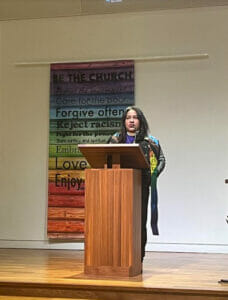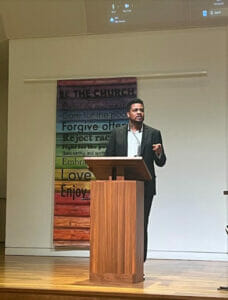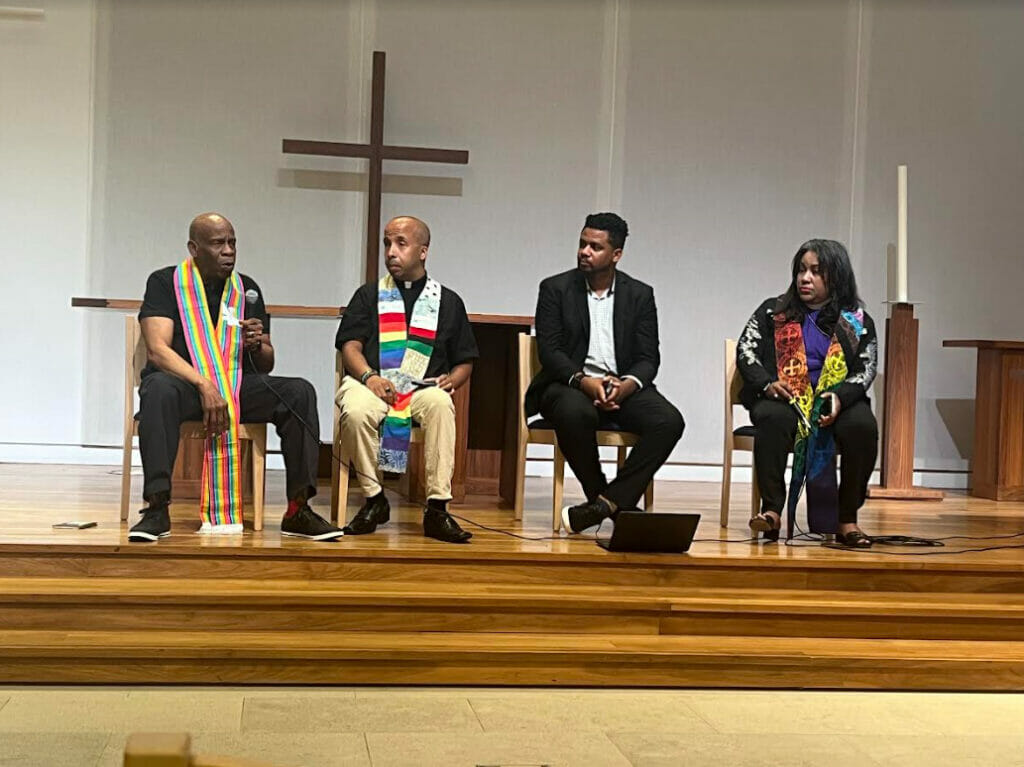Washington D.C.– Eight leaders from various Christian denominations and professions spoke to the fight for Black LGBTQ equality Friday evening at a 60th March on Washington pre-event called “Listening Session: Learning From Black Queer Voices” at First Congressional UCC Church in Washington DC.
The GLAAD-sponsored panel brought numerous Black LGBTQ faith leaders to the forefront of the conversation on religion and LGBTQ affirmation in religious spaces. However, much of the lived experiences shared by panelists took us to places of exclusion in the church before inclusion.

Bishop Allyson Abram – a GLAAD Media Institute alum – took us back to 2013, the year she married her wife.
At the time she was still pastoring for a Black Baptist Church in Detroit, who didn’t know she was a same-gender loving person. Abrams didn’t want to hide, she wanted to radiate the pride she felt inside.
She went to her friend who had business with multiple Black-owned newspapers in the state.
“I said ‘I need you to give me your best editor for [the Michigan Chronicle] newspaper, and I need to be respected, and not mistreated with the information I want to share,’” Abrams recounted to the audience.
Her story ended up on the front page of the Michigan Chronicle and the Detroit Free Press, one of the largest newspapers in Michigan.
“They [the church] were not happy with the fact that a Bishop actually married another Bishop of the same gender,” Abrams said.
In the end, Abrams resigned from her position and she found one of the few LGBTQ-affirming churches that could be found in Detroit in 2013. Today, Abrams is a bishop with The Fellowship of Affirming Ministries, a presiding prelate of Pneuma Christian Fellowship, and a senior pastor of Empowerment Liberation Cathedral in Silver Spring, Maryland.
“And so the cause to fight for the rights, and stand up and be a person, for the LGBT community had landed in my lap,” she said. Abrams never looked back.
The bishop was joined in person by Rev. Redeem Robinson, Rev. Jason Carson Wilson, Rev. Dr. Chuck Rhodes, and virtually by therapist and producer, Angela Harvey, the Human Rights Campign’s Carmarion D. Anderson-Harvey, Bishop Yvette Flunder (the Presiding Prelate of TFAM), and Rev. Adalphie Johnson.
Rev. Redeem Robinson also spoke about LGBTQ discrimination in the church.

Robinson grew up in the Methodist Episcopal Church before he went over to The African Methodist Episcopal Zion Church (The AME Zion Church). The pastor shared that the AME Zion Church was birthed in 1970 by Richard Allen as a result of racial discrimination by white churchgoers against Black churchgoers. The AME Zion Church refers to itself as “the freedom church,” the reverend continued.
However, he noticed that this freedom didn’t extend to himself, an openly gay Black man, nor his LGBTQ brothers, sisters, and siblings. He called this discrimination hypocrisy.
“We keep saying all Black lives matter,” said Robinson. “We can’t call ourselves the ‘church of freedom,’ ‘the church of justice,’ and we are excluding others. This doesn’t make sense.”
Snaps and claps echoed from the audience members throughout the auditorium. There was a mightiness about the intimacy in the room.
The pre-event set the tone for the 60th March on Washington. This tone was to act with intersectionality. To see that each and every community oppressed by the nature of being both Black and LGBTQ has the power when fighting as one community and together.
Read more about the 60th March on Washington here.
“It is my hope that in this work we’re calling ‘continuation of the movement’ that we start having intentional dialogues and conversations around intersectionality within our Black community,” said Bishop Yvette Flunder. “Stick with us so you can learn to be open-minded, lean in.”
Flunder continued with a psalm.
“I am fearfully and wonderfully made,” Flunder said. “There’s no way that the enemies of justice can prevail when we are fully aware of who we are.”
Other Sponsors of the event include TFAM, the Bayard Rustin Liberation Initiative: Angelic troubling making for justice, and the All Souls Movement, an inclusive faith and liberation movement.













